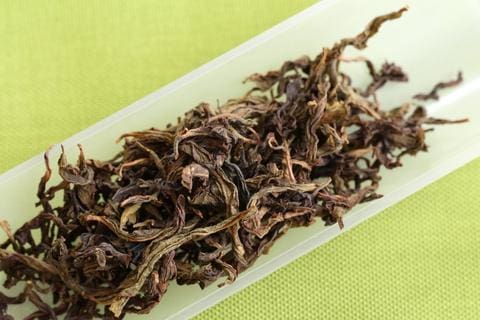
Bai Ji Guan: One of the Four Famous Wuyi Rock Oolongs and Why You’ve Never Heard Of It

Of the four great tea bushes of Wuyishan (四大名丛), arguably none is more precious than Bai Ji Guan (白鸡冠), and yet, strangely enough, there is a good chance that you haven’t even heard of this incredible tea. It may not have the level of fame that Da Hong Pao possesses in the west, but that’s not on account of it lacking in appearance, aroma, or flavor. Rather, the answer is far simpler — it is rare to find this tea outside of Fujian.
Why?
Let’s take a look at what makes Bai Ji Guan special, and why it has managed to evade popularity beyond the area in which it is grown.
Bai Ji Guan is sometimes translated as “white cock’s comb” or “white rooster crest.” Some say that this has to do with the yellow color of the processed leaf, believing that it resembles the crest of a rooster, but this isn’t quite right.
The name was established during the Ming Dynasty (1368–1644 AD), and while the leaf possesses a golden color in appearance, the name was given to this tea because when the sun shined down upon them, the older leaves looked as though they were white in color and, with their buds arranged around them, they resembled the crest of a rooster.
The vibrant yellowish hue of these leaves is owed to a fortuitous mutation, and this helps them stand apart from all other tea bushes throughout the world. But it is this mutation that also makes this tea so difficult to source.

Because there are so few tea bushes of this unique cultivar, the overall yield in any given season is extraordinarily small by comparison to other Wuyi oolongs. This is compounded by the fact that it is much harder to craft this tea than other rock oolongs, and yancha are already difficult enough to process.
While Wuyi teas tend to have a medium to high level of oxidation, Bai Ji Guan falls within the 25–50% oxidation range, which means quite a bit of skill is required to oxide this tea just right, enough to bring out the flavor but not too much so that it becomes like any other tea from this region. The slightest mistake, and the entire batch is ruined. And with its abnormally small leaf size, it is easy to make such a mistake.
Thus, very few with the necessary set of skills to process this tea are willing to even craft Bai Ji Guan, concerned that the smallest mistake will ruin their investment. This makes White Rooster Crest rare, valuable, treasured.
The rarity of this tea is fortunately matched by the rewarding taste. Bai Ji Guan tends to be complex, difficult to compare to other teas. There’s a natural sweetness that accompanies its fruity profile of bright, freshly sliced pears and peaches, but these summer fruits are softened by a calming floral note reminiscent of elderflower essence. As is typical of yancha, however, there is also the minerality that one expects, the rich yan yun (岩韵) that spreads like a mist up through the mouth and lingers in the nose.
To put it simply, Bai Ji Guan is a true delight and treat for the senses.
